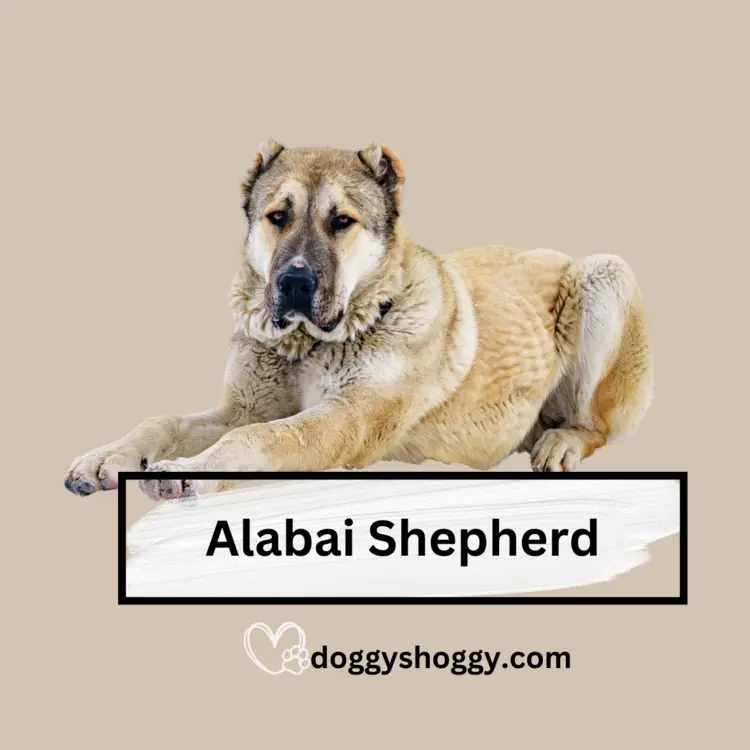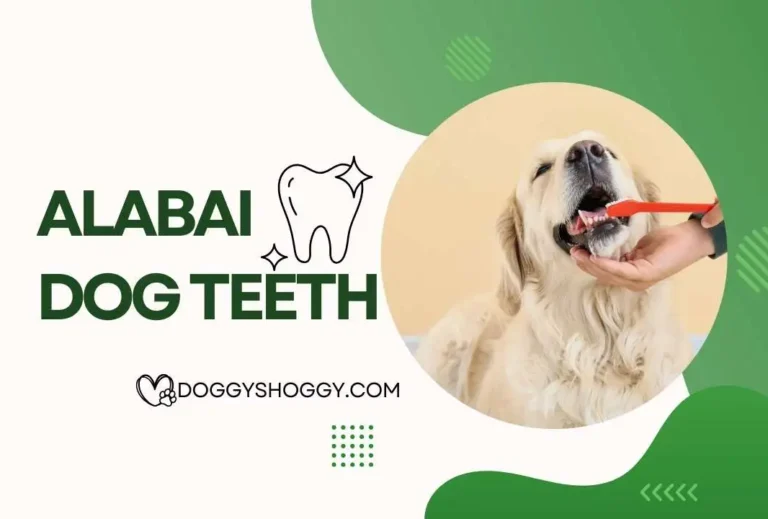Turkish Alabai Dog
The Turkish Alabai dog is a significant and robust dog from Turkey. People also call it the Anatolian Shepherd or Kangal. These dogs are famous for being loyal and protecting their family and animals. They have a thick coat and a severe face that makes them look tough. But actually, they’re very friendly with their family. Nomads bred them to keep their animals safe from wild animals like wolves. They can be great friends and guards with training, always watching out for their loved ones.
Table of Contents
Origins and History of the Turkish Alabai Dog Breed
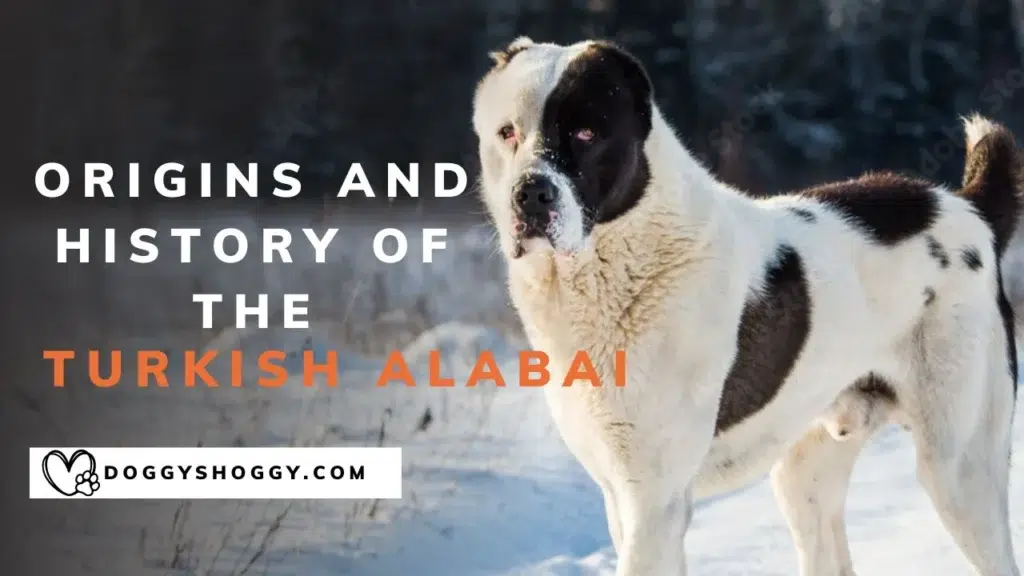
The Alabai Turkish dog, also known as the Anatolian Shepherd, is a majestic and ancient breed from the Anatolian region of Turkey. These dogs have been companions to humans for centuries, playing vital roles in protecting livestock and property.
Ancient Roots
The roots of the Turkish Alabai can be traced back thousands of years to the time of the Assyrians and Hittites. They were revered for their loyalty, strength, and protective instincts, which are still cherished in the breed today.
Guardian of the Anatolian Plateau
Turkish Alabai have been guardians of the Anatolian Plateau for centuries, serving nomadic tribes in protecting their livestock to from predators like wolves and bears. Their unwavering dedication and fearlessness earned them a special place in the hearts of their human companions.
Recognition and Preservation
Despite their long history, the Turkish Alabai breed faced endangerment in the early 20th century due to modernization and changes in lifestyle. However, efforts were made to preserve the breed, and it gained recognition by international kennel clubs for its unique characteristics and historical significance.
Present Day Status
Today, the Alabai Turkish dog continues to thrive, both in its homeland and around the world. It remains a symbol of strength, loyalty, and resilience, embodying the rich cultural heritage of Turkey and serving as a beloved companion to many.
Characteristics and Physical Attributes of the Turkish Alabai
The Turkish Alabai is a large and powerful breed known for stature and protective instincts. Understanding its physical attributes is essential for potential owners to provide adequate care and support.
Size and Build
Turkish Alabai are large and muscular, with males typically standing between 28 to 32 inches tall at the shoulder and the females slightly smaller. Their robust build and strong bones reflect their history as working dogs capable of enduring harsh conditions.
Readers Also Like: Alabai Dog Teeth
Coat and Color
One of the most striking features of the Turkish Alabai is its dense double coat, which provides insulation against both cold and heat. The coat can come in various colors, including fawn, brindle, white, and piebald, often with a black mask on the face.
Head and Expression
The breed’s head is broad and robust, with a distinctive stop and a moderately sized muzzle. Their expressive eyes are typically brown and convey intelligence, alertness, and a hint of aloofness, reflecting their guardian instincts.
Tail and Ears
Turkish Alabai have a high set tail that is usually carried in a curl over the back when alert but may hang down when relaxed. Their ears are medium-sized and set high on the head, with a triangular shape that adds to their vigilant appearance.
Temperament and Behavior Traits of the Turkish Alabai Breed
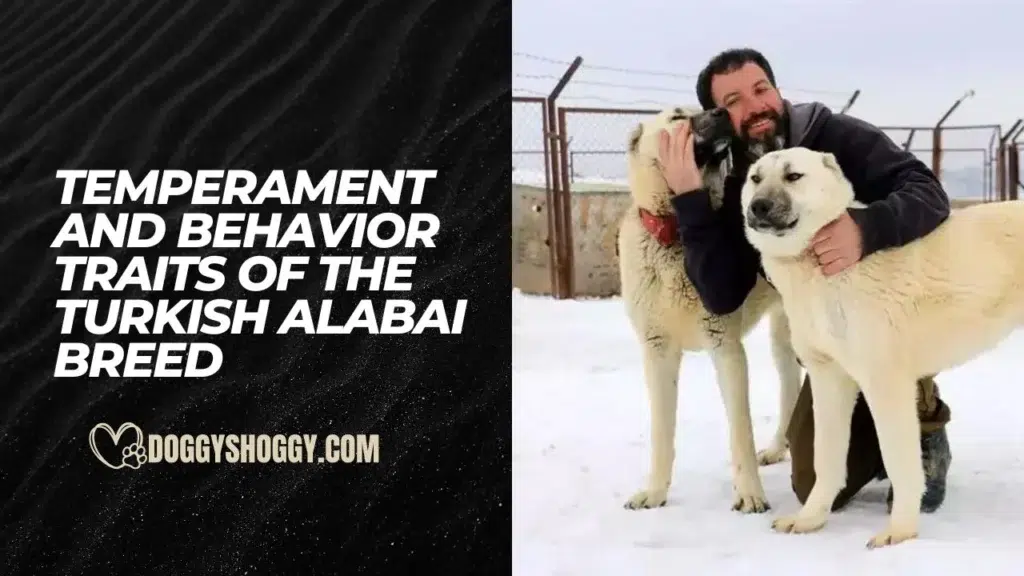
Understanding the temperament and behavior traits of the Turkish Alabai is crucial for potential owners to provide proper training, socialization, and care. While loyal and protective, they require consistent guidance and understanding to thrive as family companions.
Loyalty and Devotion
Alabai Turkish dogs are renowned for their unwavering loyalty and devotion to their families. They form strong bonds with their human companions, which will significantly protect them from perceived threats.
Protective Instincts
As natural guardians, Turkish Alabai dogs exhibit strong protective instincts towards their loved ones and territory. They are alert, vigilant, and fearless, making them excellent watchdogs and deterring potential intruders.
Independence and Confidence
Due to their heritage as working dogs, Turkish Alabai breeds are independent and confident in their abilities. While affectionate with their families, they may display aloofness towards strangers and assertiveness in unfamiliar situations.
Training and Socialization
Early training and socialization are essential for Turkish Alabai dogs to channel their protective instincts positively and develop good manners. Positive reinforcement techniques, consistency, and patience are vital in shaping their behavior and building trust.
Care and Training Tips for Owners of Turkish Alabai
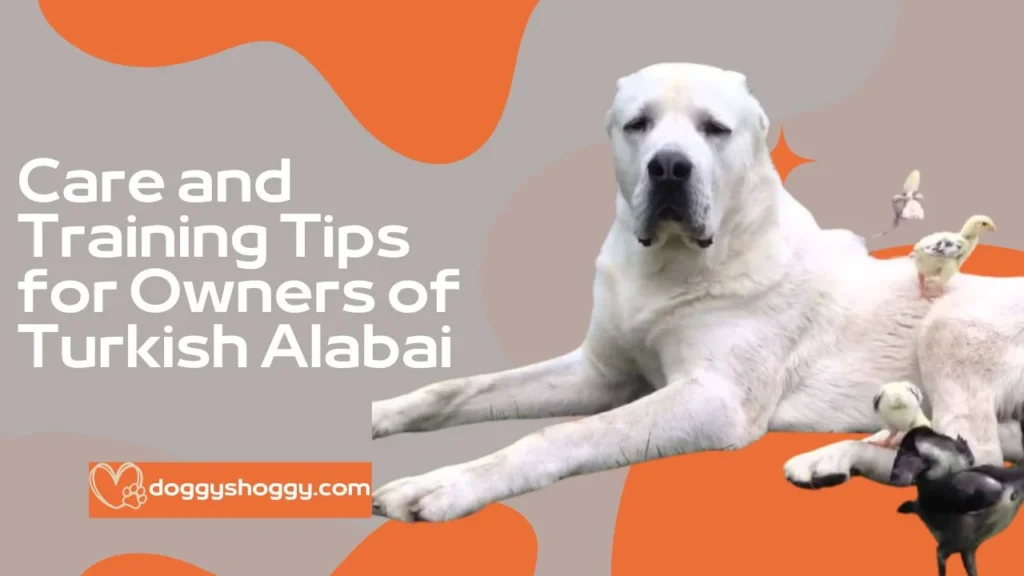
Owning a Turkish Alabai is responsible for ensuring their well-being, happiness, and integration into the family. From grooming to exercise, here are some essential care and training tips for owners to consider.
Grooming Needs
Despite their thick coats, Turkish Alabai dogs are relatively low-maintenance in grooming. Regular brushing to remove their loose hair and prevent matting is essential, especially during shedding seasons. Additionally, trimming of their nails and cleaning their ears regularly promotes good hygiene.
Exercise Requirements
Turkish Alabai are active and energetic, requiring regular exercise is to stay healthy and mentally stimulated. Daily walks, playtime in the securely fenced yard, and interactive toys are excellent ways to fulfill their exercise needs and prevent boredom.
Nutritional Needs
A balanced diet tailored to the Turkish Alabai’s age, size, and activity level is crucial of their overall health and well-being. High-quality dog food with essential nutrients, vitamins, and minerals supports their growth, muscle development, and immune system.
Health Considerations
Like all breeds, Turkish Alabai are prone to specific health issues, including the hip dysplasia, bloat, and skin allergies. Regular veterinary check-ups, vaccinations, and preventive care help detect and address potential health concerns early.
Training and Socialization
Early and consistent training is paramount for Alabai Turkish dogs to become well behaved companions. Positive reinforcement methods, firm but gentle guidance, and plenty of socialization with people and other animals help them develop into confident and obedient pets.
Bottom Line
The Turkish Alabai dog is a remarkable breed with a rich history, impressive physical attributes, and unique temperament traits. As loyal guardians and beloved companions, they bring joy, protection, and companionship to their families, making them cherished members of any household.
10 Useful and Unique FAQs with Answers
What is the origin of the Turkish Alabai dog breed?
The Turkish Alabai, also known as the Anatolian Shepherd, originates from the Anatolian region of Turkey, where it has been guarding livestock for centuries
How big do Turkish Alabai dogs get?
Turkish Alabai are large breeds, with males typically standing between 28 to 32 inches tall at the shoulder and females slightly smaller
What colors do Turkish Alabai dogs come in?
Turkish Alabai can come in various colors, including fawn, brindle, white, and piebald, often with a black mask on the face
Are Turkish Alabai dogs good family pets?
Turkish Alabai can make excellent family pets with proper training, socialization, and understanding of their protective instincts
Do Turkish Alabai dogs require a lot of exercise?
Turkish Alabai are active and energetic breeds that require to regular exercise to stay healthy and mentally stimulated
Are Turkish Alabai dogs good with children?
With early socialization and supervision, Turkish Alabai can be good with children, as they are loyal and protective of their family members
Do Turkish Alabai shed a lot?
Turkish Alabai have dense double coats that shed moderately, especially during shedding seasons, requiring regular grooming to manage loose hair
What health issues are common in Turkish Alabai?
Common health issues in Turkish Alabai include hip dysplasia, bloat, and skin allergies, highlighting the importance of regular veterinary check-ups and preventive care
How should Turkish Alabai dogs be trained?
Turkish Alabai respond well to positive reinforcement training methods, firm but gentle guidance, and early socialization to shape their behavior positively
Are Turkish Alabai dogs suitable for apartment living?
Turkish Alabai are large breeds that require space to move around and regular exercise, making them more suitable for homes with spacious yards rather than apartments

